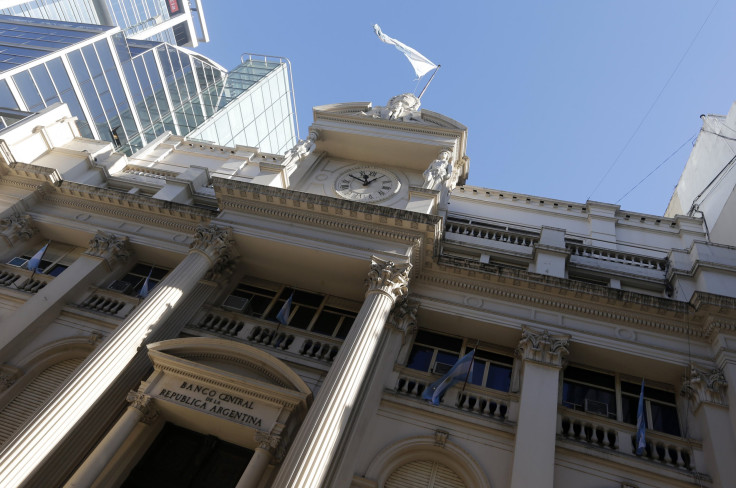Argentina Says Next Bond Payment 'Impossible', Default Looms

BUENOS AIRES (Reuters) -- Argentina threatened to default on its debt Wednesday when the government called it "impossible" to pay bond service due on June 30, citing a U.S. court decision earlier in the day that increased pressure on the economically ailing country.
Buenos Aires is locked in a 12-year legal fight with creditors who refused to participate in two restructurings that followed Argentina's 2002 default on $100 billion in bonds.
The long impasse in the U.S. courts has kept the country from accessing international capital markets as its economy stagnates, inflation soars and central bank reserves fall.
On Monday, the U.S. Supreme Court declined to hear an appeal by Argentina in its battle against the hedge funds that refused to take part in restructurings offered in 2005 and 2010. This left intact a ruling by U.S. Judge Thomas Griesa in New York ordering the country to pay the hedge fund "holdouts".
The 2nd U.S. Circuit Court of Appeals on Wednesday lifted the stay it had placed on an injunction by Griesa barring payment to holders of restructured bonds via U.S. banks unless the "holdouts" were paid $1.33 billion at the same time.
"The lifting of the stay by the 2nd Circuit makes it impossible to make the next payment on restructured debt in New York, and shows a complete lack of willingness to negotiate under conditions different from those dictated by Judge Griesa," a statement from the Argentine Economy Ministry said late Wednesday.
Talks are nevertheless expected between the two sides in New York next week.
The holdout creditors are led by NML Capital Ltd., a division of billionaire Paul Singer's Elliott Management Corp., and Aurelius Capital Management, chaired by Mark Brodsky, who warned that next week's negotiations could prove to be a "charade."
The holdouts, disparaged as "vultures" by the Argentine government for picking over the bones of the country's traumatic 2002 economic crisis, are suing for 100 cents on the dollar rather than swallow the steep discounts that were accepted by holders of bonds that were restructured.
In its statement, the ministry "lamented" Wednesday's lifting of the stay. It said it remained willing to pay holders of its revamped debt but for the fact that the holdouts would have to be paid at the same time, something Argentina says it cannot afford to do.
"Pari Passu (equal treatment) requirements impede Argentina from making the June 30 coupon payment to the holders of restructured bonds unless, at the same time, it pays all that is being demanded by the vulture funds, which could be up to $15 billion in total," the Economy Ministry said.
That would be more than half the reserves held by the central bank of Argentina, Latin America's No. 3 economy and a major corn and soy exporter.
A technical default would not occur immediately on June 30 because the government has a grace period of 30 days before such a determination can be made.
NEGOTIATIONS WITH "HOLDOUTS"
Earlier on Wednesday, a lawyer for Argentina said in Manhattan federal court that Argentine officials will seek next week to negotiate for the first time with the holdouts.
"I've been informed by Argentina that the authorities will be in New York next week and want to negotiate with the holdouts," said Carmine Boccuzzi of Cleary Gottlieb Steen & Hamilton at a hearing before Griesa.
Any meeting between the hedge funds and Argentine officials would be their first.
"Argentina’s lawyer has informed the court that unidentified government officials will come to New York on an unidentified day next week to discuss settlement after years of rebuffing settlement overtures," said Aurelius' Chairman Mark Brodsky.
"I have learned not to rely on any assurance Argentina’s counsel provide to our courts. I expect a charade, but I hope to be proven wrong," he added.
A source familiar with NML's thinking said the firm is weighing its options and is waiting to see what comes from the negotiations. Those options will include weighing the right mix of cash and/or bonds to settle the dispute.
In a televised address to the nation on Tuesday, President Cristina Fernandez de Kirchner said Argentina was the victim of "extortion" by the holdouts, but that she was still open to negotiations and insisted she would continue to pay the more than 90 percent of creditors who accepted the restructuring terms.
On Tuesday, Economy Minister Axel Kicillof floated the idea of Argentina swapping its bonds governed by New York law for those under local jurisdiction as a way out of the bind.
Wednesday's Economy Ministry statement said: "Argentina reiterates its willingness to pay the holders of restructured bonds, which it has always offered to honor under Argentine law."
The U.S.-denominated discount bonds due in 2033 ARGGLB33=RR were lately traded at 72.6 cents, down more than 10 cents since Friday, but recovering most of the day’s losses after the government said it would negotiate. The yield was lately at 12.41 percent, according to Thomson Reuters data.
The increased concern of default has boosted the cost of insurance against such an occurrence. The annual cost of insuring $10 million of Argentina's debt from default for five years rose to 2805 basis points on Wednesday, but after the hearing fell to 2173 basis points, according to Markit.
Argentina's Merval .MERV stock index gained 2.9 percent Wednesday, rallying for a second day following a 10 percent drop on Monday. For the year, the index has been a stellar performer, rising 43 percent, and hit an all-time record last week.
Argentina has just $910 million of net notional amounts of CDS contracts, up from a low of $750 million reached in December 2013, according to data from the Depository Trust & Clearing Corporation. By comparison, Brazil has more than $17 billion.
The case is NML Capital Ltd et al v. Argentina, U.S. District Court for the Southern District of New York, No. 08-6978.
(Reporting by Joseph Ax, Nate Raymond, Alexandra Ulmer, Alison Frankel, Daniel Bases, Hugh Bronstein, Carolyn Cohn and Sujata Rao-Coverley)
© Copyright IBTimes 2024. All rights reserved.
Join the Discussion





















